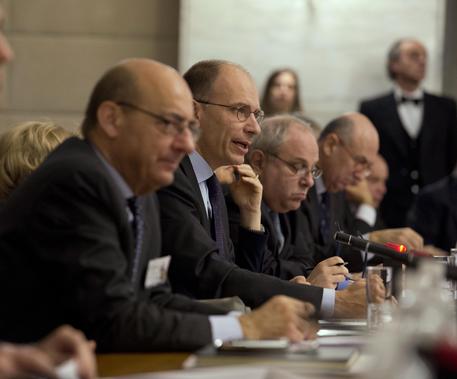(By Sandra Cordon) (ANSA) - Rome, December 18 - The Italian government's 2014 budget package arrived on the floor of the Lower House Wednesday after it gained approval - with some significant amendments - from the House budget committee. Premier Enrico Letta's coalition government is working to see its budget bill, which has been criticized for not doing enough to stimulate growth in Italy's struggling economy, passed before the end of the year. The budget includes small tax cuts and Letta has promised that a portion of future savings, which the government is confident it will find from a spending review as well as a crackdown on tax evasion, will be used to further reduce taxes on labour. As well, the package includes cuts to the top level of pensions and proposes some new local taxes grouped together as the IUC to replace the IMU property tax, which was scrapped on primary residences earlier this year. Still, several measures in the budget package have triggered debate and even anger as late Tuesday night, some members of the anti-establishment 5-Star Movement (M5S) and ex-premier Silvio Berlusconi's Forza Italia (FI) party walked out in protest. One of the more controversial measures was a tax on web sales, and Matteo Renzi, the newly elected secretary of Letta's Democratic Party (PD), also objected to the measure that would affect Internet sales by companies, many international, of products to Italian customers. As a result of the broad-based political disapproval, the House budget committee reduced the web tax to avoid discriminating against businesses that operate online. An amendment to introduce a so-called "Tobin tax" on financial transactions was also dropped. As it stands, the budget package does not devote enough resources to cutting employment taxes as deeply as required, said Giorgio Squinizi, president of powerful industrial employers' confederation Confindustria. "The resources devoted to reducing (labour taxes)...are in our view absolutely insufficient," said Squinzi. Letta has said the package should be praised for cutting taxes, rather than raising them, while keeping the country on course to stay within the European Union's 3% deficit-to-GDP-ratio limit. Many Italians are anxious to see tax reductions. According to recent data provided by the Bank of Italy, the country's tax burden climbed to 44% of gross domestic product (GDP) in 2012, compared to 42.5% in 2011. This means the country has the fourth-highest tax burden in the eurozone, alongside Finland, and the sixth-highest in the European Union as a whole. The high tax level is widely seen as a factor in recession-hit Italy's poor economic performance over the last decade. There is also widespread dissatisfaction at the level of public services people receive in return for the high taxes. However, severe economic weakness has taken a deep toll on government revenues from taxes. On Wednesday, the head of the Equitalia collection agency said that tax revenues have likely fallen by about seven billion euros this year. That represents a fall of almost 7% in collections compared with last year, said Benedetto Mineo. Italy's worst recession since the Second World War has greatly reduced the government's room to maneuver financially, but Letta said Wednesday that he sees the seeds of recovery are beginning to sprout. After eight consecutive quarters of deep losses in the country's GDP, flat results in the July-September period with respect to the previous three months, was seen as an improvement. In the fourth quarter, the government forecasts that Italy will return to positive growth. "The fall in GDP has stopped and the interest rates (on Italy's huge public debt) have come down by a significant degree," said Letta. He added that he was confident Italy's economy can grow by 1% in 2014 and 2% in 2015. "(That) is a goal that is within our reach if the interest rates remain low, confidence in Italy remains strong and, obviously, the public accounts stay in order," Letta told a meeting of Italian ambassadors.
>>>ANSA/ Govt's contested budget package reaches floor of House
Confindustria says fiscal plan does not go far enough
 FOTO
FOTO